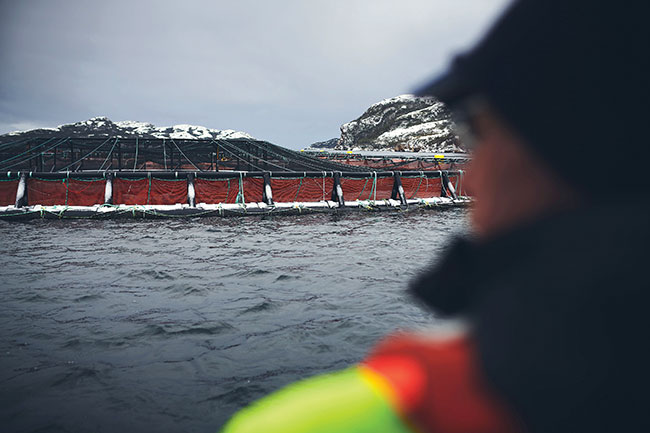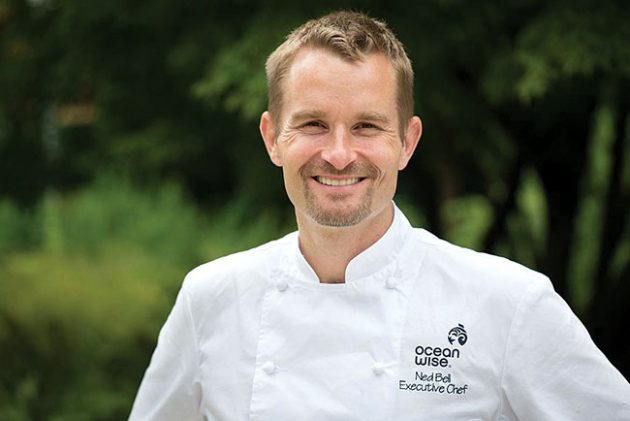
Proud to say the ‘F’ Word: The future of sustainable seafood is farmed
September 25, 2019
By Ned Bell
 Credit: NAIA
Credit: NAIA Growing up on the West Coast, I’ve always felt connected to the extraordinary power, inspiration and importance of our oceans. For thousands of years, our shared Pacific Northwest ecosystem has fed communities with wild – and cultivated – seafood rich in the nutrients we need to thrive. An abundance of wild Pacific salmon is crucial to the health and wellness of Indigenous peoples, our coastal cultures, and the orcas, bears, forests and rivers that salmon nourish. I hear from the elders that we’re made of 80 percent Wild Salmon, and I believe it.
As we look to the future and consider how to sustain our deep connections with delicious healthy seafood–while protecting our oceans–it is clear that ocean farming and aquaculture have essential if not starring roles to play.
That’s because when it comes to the fish we eat today, unfortunately global wild capture fisheries have been at or above sustainable harvesting levels for the past 30 years. Climate change, urbanization, pollution, plastics and other pressures all add to fragile state of our oceans. Fish caught from the oceans now equals less than half of the total seafood we eat globally. Yes, we already mostly eat farmed fish–but I’m fearful that many people still see farmed as a Four-Letter Word.
Nature gives us wild fish, but it’s not our right to harvest it all. If our growing population wants to keep eating fish (and I certainly do), the future is farming.
That’s a big statement, but it’s essential to explore it with a fresh, forward-looking perspective. Yes there are challenges with aquaculture, but we must rise to the far greater challenge of sustaining both our seafood supplies and global oceans. In the 21st century, the good of farming fish outweighs mistakes of the past. It is essential to ask tough questions, understand history and build a path forward.
In my opinion, one of the only ways we can continue to consume seafood with any sense of ethical sustainability is to use seafood that is responsibly farmed, responsibly harvested and, maybe most importantly, properly understood.
The sustainable seafood movement is only two decades old. But now, as a chef, I can look to transparent, science-based standards like Ocean Wise for guidance. More than 400 fisheries–responsible for 12 million tonnes of seafood annually–are engaged with the Marine Stewardship Council (MSC) but that’s still only 14 percent of our global catch. And only since 2012 have Aquaculture Stewardship Council (ASC) standards, also developed through WWF, been available. I call these trusted certifiers “Ocean Guardians.”
The next generations of chefs and ocean farmers have a common interest in moving beyond black-and-white divisions of the past. We need to farm and restore our oceans, continually invest in and improve technology, and promote the most innovative solutions. By ensuring we put oceans and ecosystems first, we can care for the fish we grow and, in turn, responsibly nourish ourselves.
As the sustainable seafood movement continues to grow, and old divisions are overcome by common passion to do better in the future, I am convinced that environmentally responsible procedures will become firmly rooted as standards. Together, we can dive deeper into challenges and opportunities, and create a road map to get us to a place where healthy communities are proud to produce and consume both wild and farmed fish. Responsible aquaculture is crucial for our future.

Chef Ned Bell
Vancouver-based Chef Ned Bell believes feeding fish to the world’s growing population needn’t be an either-or proposition. The sustainable seafood advocate, founder of Chefs for Oceans movement and cookbook author says ‘the good of farming fish outweighs mistakes of the past.’ He discusses how the next generations of chefs and ocean farmers can move forward, together.
Advertisement
- BC moves forward with salmon farm closures
- BC aquaponics farm gets green light to farm Coho salmon with cannabis





